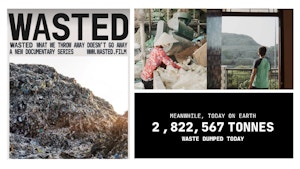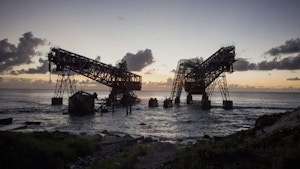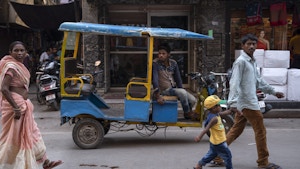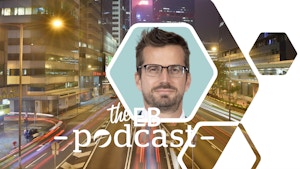Asia Pacific‘s leading platform for sustainable development
India Berita

A solar boom, Donald Trump's 'national energy emergency' and AI demand marked a landmark year.

Karbon & Cuaca
Asia-Pacific faces ‘US$500 billion a year’ hit from rising seas if current policies continue
Coastal flooding could bring US$500 billion of annual damages to the Asia-Pacific by the year 2100, if countries do not adapt to rising sea levels.

The Delhi government, in collaboration with the Indian Institute of Technology, Kanpur, recently conducted cloud seeding experiments with the claim of reducing air pollution.

Bandar-bandar
Deadly floods affect millions across South and Southeast Asia, leaving over $4 billion in loss and damage
Heavy rainfall across the region was caused by the combination of natural phenomena and climate change but in Indonesia's Sumatra, where the most lives have been lost, the scale of disaster was worsened by deforestation.
Makanan & Pertanian
Climate disasters deepen food insecurity in the Punjab
Makanan & Pertanian
Asia’s banks are failing to grasp growing food system risks: study
India Pendapat

Polisi & Kewangan
India’s climate diplomacy must account for domestic inequalities
Economic liberalisation in India has shifted the emissions burden from more equal and developed states to less equal ones. This needs to change.

China wants to lead the climate agenda on its own terms – exporting clean tech and influence, while sidestepping tougher cuts and accountability.

Makanan & Pertanian
India’s food waste is turning into an environmental time bomb
India’s colossal food waste problem is both a symptom and a significant accelerator of the climate crisis.

Polisi & Kewangan
This year’s climate talks saw real progress – just not on fossil fuels
COP30 delivered gains on climate finance and forests but stalled on fossil fuel phaseout – exposing both the limits of consensus talks and the growing role of action outside negotiations.
Karbon & Cuaca
From Rio to Belém: The long unravelling of climate consensus
Makanan & Pertanian
India’s farm policies behind bad air, unhealthy diet, water crisis
India Video

Launched as policymakers lock horns with petrochemicals lobbyists over a treaty to end plastic pollution, the documentary produced by Eco-Business asks why opportunities to solve humanity's waste crisis are being wasted. It will premiere in Singapore and screen on the sidelines of the upcoming COP28 climate summit.

Studio EB
There are vast mineral riches lying on the ocean floor that could help to power the energy transition, but is the environmental cost of extracting them worth the risk?

Karbon & Cuaca
Eco-Business releases Arctic Awakening
Produced and directed by Eco-Business managing editor Jessica Cheam and video journalist Fraser Morton, who journeyed to Norway earlier this year, the documentary has played to thousands of visitors at Marina Bay Sands’ ArtScience museum since its premiere on 4 October.

Pengangkutan
A social venture on the road to improve lives, reduce emissions with electric rickshaws
With a vision to end the drudgery of manual rickshaw pulling, social enterprise SMV Green is also helping restore clean air in one of India's most polluted cities through electric rickshaws.
India Audio

Bangunan Hijau
Inaction is not an option for companies in climate-vulnerable nations like India: Lodha ESG chief Aun Abdullah
In the latest episode of 'On the frontlines', the real estate giant's ESG head tells the EB Podcast that while there has been no pushback on climate action by corporate India, questions remain over whether the booming real estate sector is decarbonising fast enough.

Karbon & Cuaca
Just another cost centre? CLP Power’s Hendrik Rosenthal on justifying sustainability in turbulent times
In the second episode of 'On the frontlines', power firm CLP's group sustainability director Rosenthal talks to the EB Podcast about the challenges of steering sustainability in a carbon-heavy industry, closing coal plants and the need for pragmatism.

The chief executive of World Resources Institute also told the Eco-Business Podcast that the gutting of USAID is less of a concern than how to unlock private capital for climate and nature in developing countries.

CSR
ESG in retreat? In India more companies see climate action as strategic: Mahindra CSO Ankit Todi
In a new series 'On the frontlines' that spotlights the challenges facing corporate changemakers, the sustainability chief for the Indian conglomerate argues that while language around ESG has become muddled, this should not prevent climate action.
India Siaran Akhbar

United Nations Economic and Social Commission for Asia and the Pacific (ESCAP)
UN warns of rising heat risks in Asia and the Pacific

UN Environment Programme (UNEP)
Amid rising heat, sustainable cooling can slash emissions and save trillions of dollars

United Nations Environment Programme (UNEP)
Asia’s environmental enforcement leaders honored for cross-border impact

United Nations Environment Programme (UNEP)
Asia-Pacific environment leaders urge action for a sustainable and resilient planet
India Penyelidikan

Eco-Business & Regional Project Energy Security and Climate Change Asia-Pacific of the KAS
The value of biodiversity for Asia's megacities

Centre for Asian Philanthropy and Society (CAPS)
Public-private partnerships for social good

SolAbility - Sustainable Intelligence
The Global Sustainable Competitiveness Index 2019






